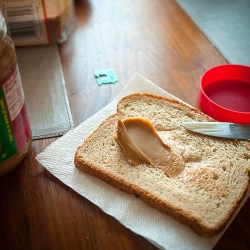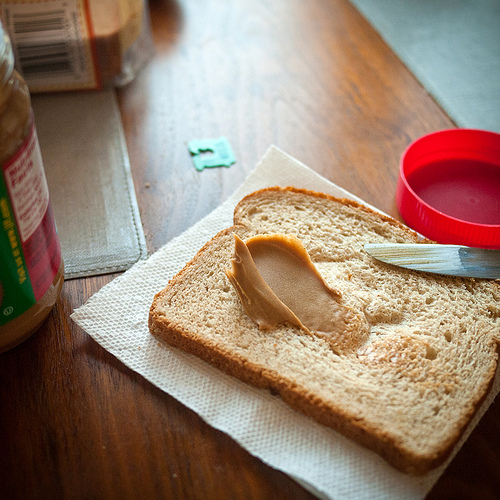
vivarinThe odds are super low that this will make you sick, but still.
For the first time, the Food and Drug Administration has used the power it gained in the landmark 2011 food safety bill to shut down a manufacturer.
In September, an outbreak of salmonella linked to organic peanut butter sold at Trader Joe’s sickened 41 people in 20 states. The tainted goo was linked back to a Sunland, Inc., plant in New Mexico — the latest in a series of problems for the site. So yesterday, the FDA revoked its license to manufacture food.
From CBS News:
Sunland had voluntarily closed its plant after a September outbreak and planned to reopen its peanut processing facility on Tuesday, with hopes of selling peanut butter again by the end of the year. Sunland’s Katalin Coburn said FDA’s decision to suspend the registration was a surprise to the company and Sunland officials had assumed they were allowed to resume operations. …
Sunland is the nation’s largest organic peanut butter processor, though it also produces many non-organic products. The company recalled hundreds of organic and non-organic nut butters and nuts manufactured since 2010 after Trader Joe’s Valencia Creamy Peanut Butter was linked to the salmonella illnesses in September.
The details of what the FDA found are … unpleasant.
During a month-long investigation, after the outbreak linked to processor Sunland and to Trader Joe’s, FDA inspectors found samples of salmonella in 28 different locations in the plant, in 13 nut butter samples and in one sample of raw peanuts.
The agency also found improper handling of the products, unclean equipment and uncovered trailers of peanuts outside the facility that were exposed to rain and birds.
The FDA said that over the past three years, the company shipped products even though portions of their lots, or daily production runs, tested positive for salmonella in internal tests. The agency also found that the internal tests failed to find salmonella when it was present.
FDA inspectors found many of the same problems — including employees putting their bare fingers in empty jars before they were filled, open bags of ingredients, unclean equipment, and many other violations — in a 2007 inspection. Similar problems were recorded by inspectors in 2009, 2010 and 2011, though government officials didn’t take any action or release the results of those inspections until after the illnesses were discovered this year.
Which prompts the question: Why wait so long? The company tests positive for salmonella for three years and then, when it finally makes several dozen people sick, the FDA steps in?
One moral of the story is: Even organic food is not without its problems. And the other moral is: Don’t eat anything, ever.




